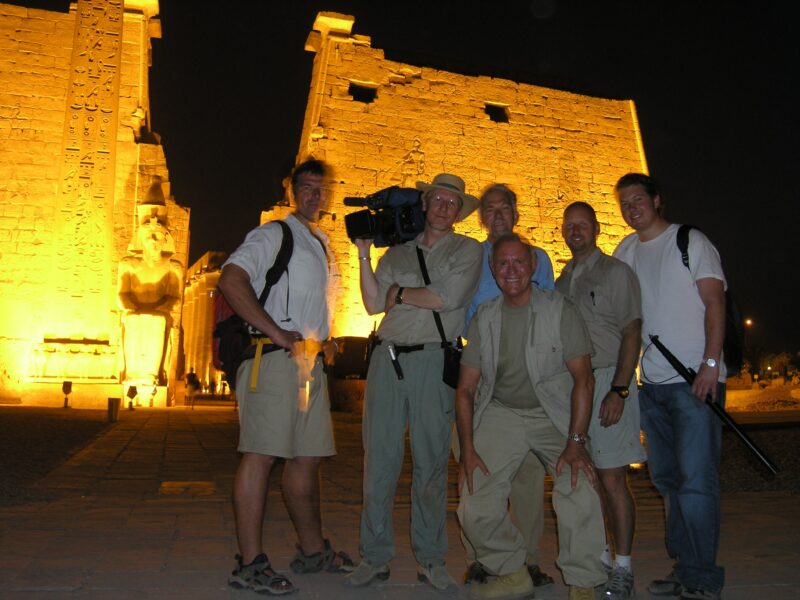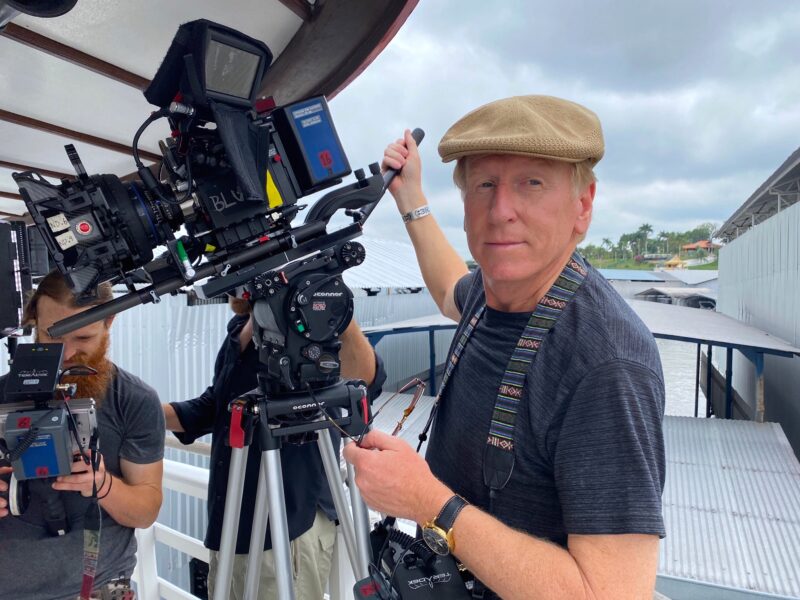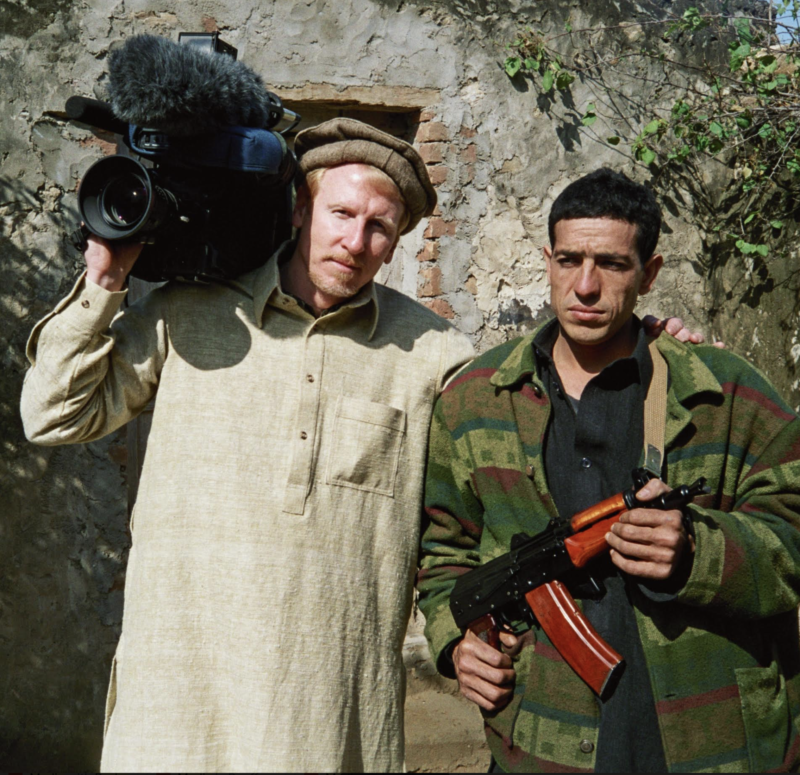By: Victoria Stevens
In recent years, filming abroad has been a popular choice for many filmmakers, however that choice has become more challenging since Covid, the situation with ever-changing insurance policies, the climate change issues, and the political upheavals in places like the middle east. Award-winning Director/Producer Marlin Darrah believes that even with all these obstacles, filming overseas is still the best option for his film projects.

“I’m known as the World’s Most Traveled Filmmaker and that’s because I have traveled to over 150 countries so far, which has helped me be more comfortable working in remote locations for my projects which other filmmakers might not be. That is how I got to carve out my niche, to be able to make films in other countries where I think Hollywood would be either afraid to go to or would be very concerned about because of insurance issues for example. When I shot my film, An Egypt Affair, in Egypt, that country was on the terrorist watch list, so bigger companies wouldn’t go there. So, for me, North American filmmakers’ challenges are not so severe at all because they can film something in their neighborhood and feel comfortable. They would also have a lot of connections that could easily help them get permits when needed. My goal as a filmmaker was to be able to stand out from the other tens of thousands of other filmmakers. Therefore, I wanted to magnify other countries into my scripts and into dramatic stories,” explained Darrah.
One obstacle that many directors face when they film overseas is figuring out which crew members will be right for which project. Filming overseas is not for the faint of heart. These crew members need to have the availability to shoot for weeks or months, be comfortable with traveling through unfamiliar cultures and customs and through areas of poverty, In addition, they need to be able to handle living closely with each other for long periods of time.
“The goal for all directors is to eventually land upon a trusted team of an exceptional cinematographer, support camera crew, sound mixer, and a boom person. Ideally you have about six people that you can say, ‘Let’s go out and have another film adventure together.’ Sometimes the problem is the availability of your core team and sometimes you encounter a mismatch of egos and temperaments on the team. Travel always pulls people to a limit and either you come back as better friends, or in some cases you don’t want to associate with each other again. It does test you so much with your patience and with issues regarding severe weather or food quality and water quality for example. And dealing with poverty is eye opening. For example, when I filmed in Egypt and in Cambodia, and we filmed off the tourist path, we found a lot of harsh conditions that people lived in,” said Darrah.

There are also many dangers associated with filming overseas. Many countries look negatively upon film crews and will question your agenda behind your film. Having to jump through these certain hurdles can get exhausting and can affect your filming schedule, especially in communist countries.
“Communist countries are very difficult to do this type of filming in. For example, Russia would be very challenging because of not knowing who to pay off, and which permits we must get from the local government. Sometimes you must pay off police or secret police even. China also would be very difficult to shoot a feature film in because it is a Big Brother society watching over you. There are cameras everywhere and you will be spotted by officials or police if you try to do something guerilla-style. So, you will have to coordinate very closely with the government to shoot a movie in China. Then you risk it taking a long time and possibly being denied because of censorship issues. Vietnam is an interesting exception because even though it’s a communist country, it’s very capitalistic at heart. I would love to shoot a film in Vietnam, but that would require a lot of government supervision and you would have to have someone come and look over your shoulder all the time,” expressed Darrah.
To film in certain countries overseas it’s good to find location managers that are well versed in how the government works in the filming area of interest, know the terrain, and the bargaining system of that specific place. That way the pre-production stage runs smoothly, and you solve certain problems ahead of time.

“I always look for location managers that know the specific areas we will be shooting in to help problem-solve certain barriers that we will come across. Many times, we will have to pay off people on the streets, guards, and police. Most of the world works on ‘a spot-permit’ or ‘hand-to-hand permit’, which is palm grease paying them off as you go. A good location manager will know the exact amount to pay for bribes, food, lodging, and other necessities to keep the production running smoothly. Many times, I can rely on my previous experience when I worked on a travel adventure film or past documentaries. I would know the lay of the land, but it’s always best with a new script to go and scout with the location manager to get a better idea of the current locations. That way I will meet the owners of certain businesses, shops, or restaurants and see how guarded a certain site is and who I would need to pay off to get permission. That way I wouldn’t waste time when the full team came over and we could just start shooting with no hiccups,” explained Darrah.

(Insert – Photo #5 – Behind the Scenes with Marlin Darrah)
When a director shoots overseas it gives the film a certain look and feel that is hard to reconstruct in the editing room. It adds a special layer to your film that allows the audience to experience a place that they have never been before. All of Marlin’s films come with this added layer of experience that keeps bringing the audience back each time.
“I really want to shoot a movie in Madagascar. There hasn’t been a feature film shot there yet and my goal is to film the next. It is going to be a fun adventure movie with a very young cast. They are looking for that historical lost treasure that is an interesting idea for a lot of people. So that is going to be more of a Dan Brown clue-based movie. Another movie I am eager to shoot is called ‘Magic Bus’ and that will shoot across Europe and across Asia. I think it will appeal to people young and old,” explained Darrah. “I believe we can shoot something very special when we are not shooting on green screen. In my eyes it’s hard to replace the true sights, sounds, smells, and feelings that you get when you are really in the countries. I believe the viewers can tell when it is truthful, honest, and the genuine article in these market streets and historical sites. For example, it’s hard to create the market streets of Egypt when you are not truly on location there, with all the authentic hustle and bustle.”
It takes a strong team to create these films that captivate the audience and leave them wanting more. Marlin Darrah has done just that, but not without his wife and production partner Lin Zuo, his two screenwriters Will Patching, Eric Weinstock, and Rick Cullis, his fellow producers Paige Baker, Nick Thomas, Alfonso DiLuca and Robert Nadell, and his DP Ian Tilson.
For more information about Marlin Darrah and his productions you can go to his Wikipedia at https://en.wikipedia.org/wiki/Marlin_Darrah and his IMDB at https://www.imdb.com/name/nm1135811.
Photo Credit: Marlin Darrah






